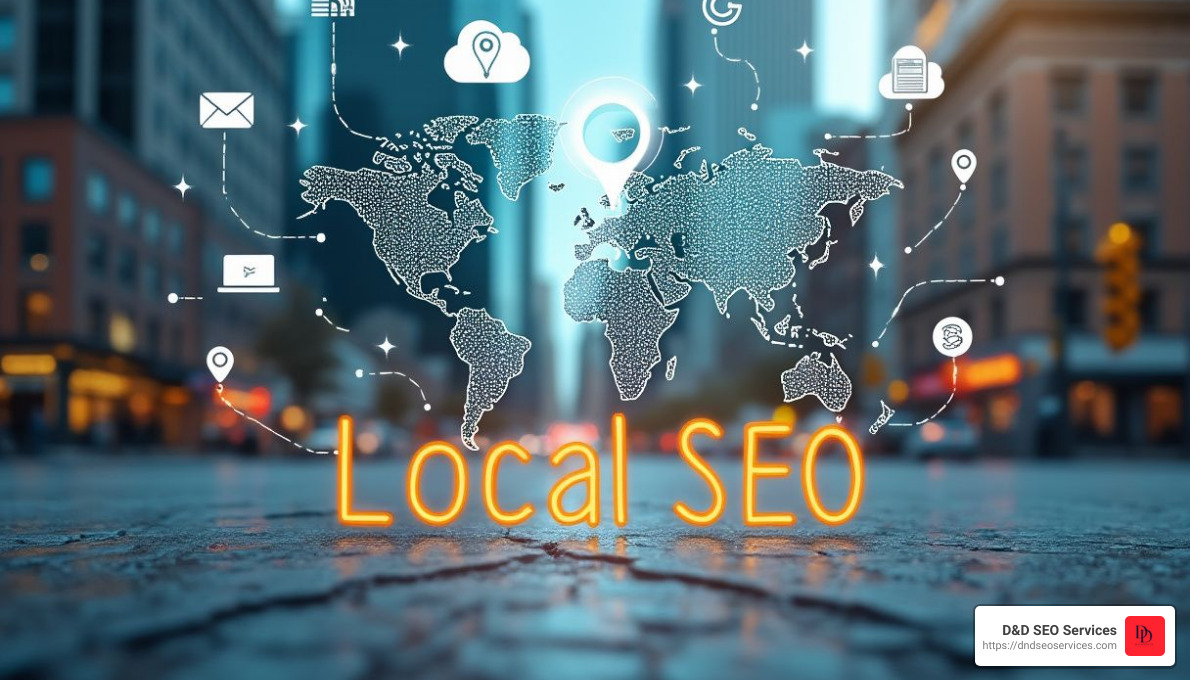Local search optimization is all about making your business visible to customers searching for products or services nearby. This includes appearing in local search results on Google Maps and Google Search. Here’s a quick rundown of what you need to know:
- Optimize your Google Business Profile to show up in local searches.
- Engage on social media to boost your local presence.
- Ensure your business information (name, address, phone number) is consistent online.
- Create location-specific content on your website.
By focusing on these strategies, you can attract more local customers and stay ahead of your competition.
I’m Danielle Birriel, the founder of D&D SEO Services. With over a decade of experience in local search optimization, my team and I specialize in helping small businesses like yours improve online visibility and drive more foot traffic.
Let’s explore understanding the core elements of local search optimization and how you can dominate your local market.
Understanding Local Search Optimization
What is Local Search Optimization?
Local search optimization, or local SEO, is all about improving your business’s visibility in location-based search results. When someone searches for a product or service “near me,” your business should be one of the top results they see. This is essential for attracting local customers who are ready to buy.
Local SEO focuses on optimizing your online presence to appear in local search results on platforms like Google Search and Google Maps. It involves several key elements, including your Google Business Profile, local content, and online reviews.
Google Business Profile is a crucial part of local SEO. It allows you to manage how your business appears on Google Search and Maps. By optimizing this profile with accurate contact details, photos, and business hours, you can improve your chances of appearing in local search results.
Why is Local Search Optimization Important?
Local search optimization is vital because a significant portion of searches have local intent. According to HubSpot, 46% of all Google searches are looking for local information. If your business isn’t optimized for local search, you’re missing out on potential customers who are ready to visit your store or use your services.
Here are some key reasons why local SEO is important:
Visibility: Appearing in local search results increases your business’s visibility to potential customers in your area. This is especially crucial for businesses with physical locations like restaurants, retail stores, and service providers.
Customer Attraction: Local SEO helps attract customers who are actively searching for products or services you offer. For example, if someone searches for “best pizza in [your city],” a well-optimized local SEO strategy can make sure your pizzeria shows up.
Google Maps and Google Search: Local SEO isn’t just about appearing in search results. It’s also about showing up on Google Maps. When people search for businesses nearby, they often use Google Maps to find directions and read reviews.
Local Keywords: Using location-specific keywords in your content and metadata helps Google understand where your business is located and what it offers. This is crucial for ranking in local search results.
Key Factors in Local Search Optimization
Three main factors influence your ranking in local search results: relevance, distance, and prominence.
Relevance: This refers to how well your business matches what the user is looking for. By optimizing your Google Business Profile and including relevant local keywords, you increase your chances of appearing in relevant searches.
Distance: How far is your business from the searcher? Google considers the proximity of your business to the searcher’s location. The closer you are, the more likely you are to show up in local results.
Prominence: This is about how well-known and well-reviewed your business is. Businesses with more reviews and higher ratings tend to rank higher in local search results. Prominence also takes into account your online presence, including links, articles, and directories.
By understanding and optimizing these factors, you can improve your local search rankings and attract more local customers.
Next, let’s explore the strategies for effective local search optimization that can help you dominate your local market.
Key Factors in Local Search Optimization
Relevance
Relevance is about how well your business matches what someone is searching for. Google looks at your business information to decide if it’s a good fit for a user’s search.
To improve relevance, make sure your Google Business Profile is complete and accurate. Add details like your business name, address, phone number (NAP), and business hours. Use local keywords in your descriptions. For example, if you run a bakery in Manhattan, mention “fresh donuts in Manhattan” or “best bakery in NYC.”
Pro Tip: Keep your business info updated. Changes in your hours or services should be reflected immediately to avoid confusing potential customers.
Distance
Distance measures how far your business is from the person searching. Google uses the searcher’s location to show nearby results.
To maximize your visibility, ensure your address is correct on your Google Business Profile. The closer your business is to the searcher, the more likely it will appear in local search results.
Example: If someone searches for “pizza near me” while in Brooklyn, Google will prioritize pizza places close to their current location.
Prominence
Prominence refers to how well-known your business is, both online and offline. Prominent businesses often rank higher in local searches.
Reviews and Ratings: Encourage happy customers to leave positive Google reviews. More reviews and higher ratings can boost your local rankings.
Online Presence: Be active on social media and get mentioned in local directories. Google looks at these signals to gauge your business’s popularity.
Local Citations: Ensure your business is listed consistently across various online directories like Yelp and Facebook. Inconsistent information can hurt your credibility.
Fun Fact: Famous landmarks and well-known businesses often appear higher in search results due to their prominence. For instance, a search for “best coffee” in Seattle might show Starbucks first because of its strong brand recognition.
By focusing on relevance, distance, and prominence, you can improve your local search optimization and attract more customers.
Next, let’s explore the strategies for effective local search optimization that can help you dominate your local market.
Strategies for Effective Local Search Optimization
Optimize Your Google Business Profile
Your Google Business Profile is the cornerstone of local search optimization. A well-optimized profile helps your business appear in local search results and on Google Maps.
Here’s how to optimize it:
- Complete Your Profile: Add accurate contact details, opening hours, and business attributes. Include photos and videos to make your profile more engaging.
- Use Google Posts: Share updates, offers, and events to keep your audience informed.
- Encourage Reviews: Ask satisfied customers to leave reviews and respond to them to show you value feedback.
Get and Monitor Local Citations
Local citations are mentions of your business’s name, address, and phone number (NAP) on other websites. These citations help Google verify your business information.
To manage local citations:
- Ensure Consistency: Make sure your NAP information is consistent across all directories and social media profiles.
- Use Listing Management Tools: Tools like Semrush’s Listing Management can help you keep your citations accurate and up-to-date.
- Submit to Directories: List your business on popular directories like Yelp, Apple Maps, and Bing Places.
Encourage and Respond to Online Reviews
Online reviews are crucial for local SEO. They build trust and influence potential customers.
Here’s how to manage reviews effectively:
- Ask for Reviews: Encourage happy customers to leave reviews on Google and other platforms.
- Respond to Reviews: Reply to both positive and negative reviews. This shows you care about customer feedback.
- Monitor Reviews: Use tools to track reviews across multiple platforms and respond promptly.
Refine Your On-Page SEO
On-page SEO involves optimizing individual pages on your website to rank higher in search results.
Key elements to focus on:
- Local Keywords: Use local keywords in page titles, meta descriptions, and content.
- Internal Linking: Link to other pages on your site to help with navigation and distribute page authority.
- Location Pages: Create pages specifically for each location if your business has multiple branches.
Build Backlinks
Backlinks are links from other websites to yours. They signal to Google that your site is trustworthy and relevant.
Strategies for building backlinks:
- Local Newspapers and Blogs: Get featured in local news articles or blogs.
- Event Sponsorships: Sponsor local events to get mentions and links on event websites.
- Guest Posts: Write articles for other websites in your industry.
By implementing these strategies, you can improve your local search optimization and dominate your local market.
Next, we’ll look at the tools you can use to streamline your local SEO efforts.
Tools for Local Search Optimization
Semrush’s Listing Management
Keeping your business information consistent across the web is crucial for local search optimization. Semrush’s Listing Management tool is an all-in-one solution for managing your business’s name, address, and phone number (NAP) details.
Key Features:
- NAP Information: Easily add and update your business’s NAP details.
- Directories: Submit your business to dozens of directories with a few clicks.
- Customer Reviews: Track and respond to customer reviews across multiple platforms.
To get started, enter your company name and select the correct address from the list. The tool will show a report of your current online presence, including listings that need fixing and your average star rating. You can also download this information for further analysis.
Google Search Console
Google Search Console is a free tool that provides valuable insights into your website’s performance on Google. It helps you monitor, maintain, and fine-tune your site’s presence in search results.
Key Features:
- Site Monitoring: Check which keywords are driving traffic to your site.
- Search Results: See how your pages are performing in search results.
- Crawlability: Ensure your site is crawlable and identify any indexing issues.
Using Google Search Console, you can understand how Google views your site and identify areas for improvement. It’s an indispensable tool for anyone serious about local search optimization.
By leveraging these tools, you can streamline your local SEO efforts and improve your visibility in local search results.
Frequently Asked Questions about Local Search Optimization
What is a local search in SEO?
Local search in SEO refers to the process of optimizing your online presence to attract more business from relevant local searches. These searches typically include a geographic component, like “coffee shop near me” or “dentist in Austin.” According to HubSpot, 46% of all Google searches are looking for local information. This means if your business isn’t optimized for local search, you could miss out on potential customers ready to shop in your area.
How to optimize for local search?
Optimizing for local search, also known as local search optimization, involves several key strategies:
- Google Business Profile: Ensure your Google Business Profile is complete and accurate. Include your contact details, opening hours, photos, and business attributes.
- Local Citations: Make sure your business name, address, and phone number (NAP) are consistent across all online directories and social media profiles.
- Online Reviews: Encourage customers to leave reviews on Google and other review sites. Respond to these reviews to show engagement and improve your online reputation.
- On-Page SEO: Use local keywords in your page titles, meta descriptions, headers, and content. Create location-specific pages if you have multiple locations.
- Schema Markup: Implement local business schema markup to help search engines understand your business information better.
For more detailed tips, check out this comprehensive guide from HubSpot.
What is the difference between local SEO and traditional SEO?
Local SEO and traditional SEO both aim to improve your visibility in search engine results, but they focus on different audiences and strategies:
- Target Audience: Local SEO targets searchers looking for services or products in a specific geographic area. Traditional SEO targets a broader, often national or global audience.
- Keywords: Local SEO uses keywords with geographic modifiers, like “plumber in Chicago.” Traditional SEO focuses on industry-specific keywords without geographic terms.
- Google Business Profile: A well-optimized Google Business Profile is crucial for local SEO but less important for traditional SEO.
- Citations: Local SEO relies heavily on local citations and directory listings, while traditional SEO focuses more on backlinks from relevant websites.
- Competition: Local SEO often has less competition compared to traditional SEO, which competes on a national or global scale.
Understanding these differences can help you decide which strategy is best for your business. For more insights, read this Forbes article.
By mastering these aspects of local search optimization, you can significantly improve your visibility in local search results and attract more customers to your business. Next, we’ll discuss how to implement these strategies effectively.
Conclusion
At D&D SEO Services, we understand that every business is unique. That’s why we offer personalized strategies designed to fit your specific needs. Whether you’re a local business aiming to increase your online visibility or a larger company targeting robust growth, our team has you covered.
Local Markets
Local SEO is more crucial than ever. According to recent data, 46% of all Google searches are looking for local information. This means a strong local SEO strategy can significantly boost your online visibility and attract more customers from your community. Our strategies are designed to help you dominate local search results, ensuring your business stands out.
Online Visibility
Good online visibility is essential for any business. Our team uses cutting-edge optimization techniques to improve your website’s performance. By integrating tools like Google Analytics and heatmap generators, we track user behavior to understand what works and what doesn’t. This data-driven approach allows us to make informed decisions that improve your online presence.
Business Growth
Our ultimate goal is to drive business growth for our clients. We achieve this by focusing on both short-term wins and long-term strategies. Whether it’s through optimizing your website for conversions or implementing effective content marketing, we ensure that every aspect of your digital presence is fine-tuned for success.
Why Choose D&D SEO Services?
With over a decade of specialization in SEO and digital marketing, D&D SEO Services stands as a trusted partner for businesses looking to lift their online presence. Our comprehensive approach ensures that you not only reach your target audience but also engage and convert them.
Ready to open up the power of local search optimization for your business? Contact us today to get started on your journey to online success!
By integrating these strategies, we help you create a stronger digital narrative that resonates with your audience, fostering growth and sustained customer relationships.








